© 2024 EasyEDA Some rights reserved ISO/IEC
Editor Version
×
Standard


1.Easy to use and quick to get started
2.The process supports design scales of 300 devices or 1000 pads
3.Supports simple circuit simulation
4.For students, teachers, creators
Profession


1.Brand new interactions and interfaces
2.Smooth support for design sizes of over 5,000 devices or 10,000 pads
3.More rigorous design constraints, more standardized processes
4.For enterprises, more professional users

Ongoing
STD Nurse Ethics
License: Public Domain
Mode: Editors' pick
- 0
Update time:
2019-10-28 16:13:33
Creation time:
2019-10-28 16:13:33
Description
Healthcare revolves around individuals and just attendance to their needs. Anyone in charge of changing or creating medical policies or the nurses and doctors themselves, are obligated to provide just care to every patient. It is morally necessary to make sure that patients receive treatment and medication they require. Nurses deal with patients the most. Often, their work is undermined, and only doctors are given all the credit. However, a doctor will only perform the surgery and prescribe medication while nurses will be in constant contact with the patients, attending to all their needs, making sure that all the procedures are carried out according to the highest standards. So, a nurse must have highest moral and ethical codes of conduct because it is easy to become careless, forgetful or desensitized to human pain and suffering. Moreover, the understanding and knowledge of the legal system are also required from the nurses. More information see in other [https://elitewritings.com/blog/139-nursing-research-topics-ideas-for-nursing-papers.html](nursing research topics).
**Philosophical View**
The most primary aspect of nursing ethics is based on a philosophical concept of providing the needed healthcare and being committed to the patient. Immanuel Kant wrote about universal laws of “the greater good”, and in relation to medical professionals, doctors and nurses are obligated by oath to do their duties according to ethical norms. The hospital environment requires staff to be polite and provide any medical care that is necessary. Such fact can be aligned with Kant’s view that it is a rational and universal law that makes it a must for one person to help another. Kant also talks about innate good that people have and the feeling of kindness towards the fellow human being. Individuals who decided to involve themselves in the medical profession, did it because they felt the need to help others, and it was within their power to accomplish it. It would be imprudent for a person to spend years of studying and resources to learn a profession of medicine if he/she did not like to interact with people. They must feel rewarded for their work in order to realize that they are needed. It is clear that their personality is closely tied to the professional requirements. The ethical and moral codes set out by the management reflect the general concepts of goodness as well as ethical attitude and behavior. Responsibilities and duties are based on the moral codes, which require respectful and equal treatment to all the patients.
**Morals and Ethics**
An article titled “Giving Back during National Nurses Week” describes the initiative that has been put forth by the nurses. It focuses on the selfless want of nurses to contribute to the community in any way possible. It shows that the majority of nurses have an innate understanding of morality and ethics. As a result, the committee offered nurses to come up with projects that will address issues and matters on how to improve the community and treat patients with higher efficiency and quality. The nursing administration also took an active part in generating donations and organization’s philanthropic contribution to the community was $15,000 last year, involved 31 projects, and generated more than 600 hours of volunteer time.
American Association of Colleges of Nursing Recommendations has set forth a proposition which would educate nurses according to most ethical decision-making strategies. In the medical field, ethics is defined as the process that takes time to evolve and develop. In the recent years, staff has been very effective in improving the treatment of the community by increasing their care and availability of the necessary resources, financial help and cooperation between the staff and the public. Sets of new policies have been implemented to make sure patients are treated according to the highest standard. Professional nursing boundaries are commonly defined as limits that protect the space between the nurse’s professional power and the patient’s vulnerabilities. Even though sometimes, boundary crossings are necessary, nurses are well educated and aware of the procedures which are to be handled with care. Ethics is important to the nursing, and thus a code was formed titled Ethical Formations: Professional Boundaries and Moral Obligations for Nurse as Specified by the ANA Code of Ethics for Nurses with Interpretive Statements. Its major criteria is to respect patient’s dignity, implement proper delegation of tasks, exhibit fair and legal judgment, moral obligation to help and ease suffering, as well as take care of patient’s needs and interests according to the standards of practice.
**Job Sensitive Conduct**
The education for doctors and nurses is particularly serious, long and high-priced. A person who invests in the education expects a high salary. For instance, a nurse might have a minor job - registration of the patient and basic treatment; taking blood pressure, measuring the temperature and taking blood samples. However, the responsibility is considered to be enormous. For example, one of the grey areas of nursing and ethics relates to a concept called “therapeutic privilege” which dictates the amount of information a nurse can disclose to the patient. In case something needs to be averted, a nurse has the full right to withhold information. It is done for health reasons as it might impair person’s condition. Eventually, it is up to the nurse’s moral and ethical understanding to decide what must be said. Morality within the nursing profession is also important because negligent behavior towards patients can be dangerous to their health. Work ethics requires nurses to take extra care of people who cannot provide for themselves, so carelessness and ignorance do not take a hold of the staff. It means that the result of an action, a missed medication or an unattended patient in need, will cause serious health effect to the patient. Ethics for nurses can be seen in all parts of the profession because they make up the greatest part of staff members at a hospital. A hospital is a network of many different departments that need proper communication and cooperation. When the system breaks down, there are many problems for both staff and patients. The quality of service suffers, and the environment becomes stressful and unhealthy for healing.
Every decision made by a professional nurse has its consequences. Each case requires specific consideration because an adequate and responsible decision might be the boundary between a pleased patient and a lawsuit. For example, someone is being treated at ICU (Intensive Care Unit) and the patient wants their restraints removed. The restraints are used in order to prevent some patients from falling out of bed or accidentally taking out the IV tube, thus it is a safety measure. The patient calls the nurses but they do not respond because they have fallen asleep, left without warning other staff or simply do not care. As a result, a patient can damage their monitoring system and even injure himself. The moral strain on the patients is also damaging because they feel like no one cares, so they become anxious and start feeling lonely. An ethical nurse will make sure that the patients are constantly monitored and checked on. They will ask patiens questions about their wants and needs, and develop a relationship which is mutually friendly and respectful. At the same time, there are cases when nurses are taking great care and watch the patient closely, but because of a bad relationship, the patient will blame the nurse for everything. In case of a relationship based on highest ethical standards, it would not happen, and a compromise would be found.
It is very respectful and honorable that nurses are taking so much care of their patients and even of people who are not directly present in the hospital. It proves that there are good individuals, and they will continue their beneficial acts keeping their moral and ethical codes intact. Any profession clearly requires some form of moral or ethical code to function, but is attributable to medicine. People are trusted with the physical and moral well-being of another human being. It creates a lot of responsibility and can take a form of pressure on the professional. As such, nurses must develop strong ethics and will power. A lot depends on their attitude and behavior because they are the representative of the hospital, profession and medicine. Overall, nurses have gained trust and respect of people, so morality is definitely present in their life and work.
The sensitive nature of care which nurses are subjected to requires the staff to be aware of the law and legal system. Nurses must follow the medical practice code, as well as know about professional malpractice court hearings which look at most common lawful and regulatory prohibitions. The state determined general rules of conduct while each particular hospital will present its own nuances to the system. The case law, regulations established based on previous court cases, will determine nurse’s behavior. That is why close knowledge of the legal part of nursing is a must. Another division of the medical regulations is Tort law which establishes rules for socially reasonable conduct and imposes liability on a party, a ‘wrong-doer’, for unreasonable conduct. It shows that not only nurses are bound by ethics and moral codes, but the legal system also has a regulatory responsibility towards the medical staff.
Moral ethics and the legal system are social divisions which closely govern the behavior and attitudes of nurses. The profession requires medical staff to respect people’s autonomy, treat everyone as a unique individual, keep a note of professional boundaries and exhibit most respectful and lawful conduct. A hospital environment is filled with people who have individual characteristics, and a nurse must adjust to the patient and their personal qualities. Education provided in the field of morality and medical obligations make up a large part of the general learning process received by medical staff. Overall, nursing is a profession based on ethical conduct, both in relation to person’s physical well-being and their mental comprehension of the situation.
Design Drawing
schematic diagram
(
1
/
)
PCB
(
1
/
)
The preview image was not generated, please save it again in the
editor.
BOM
Project Members
Related Projects
Change a batch
Loading...
Add to album
×
Loading...
reminder
×
Do you need to add this project to the album?








